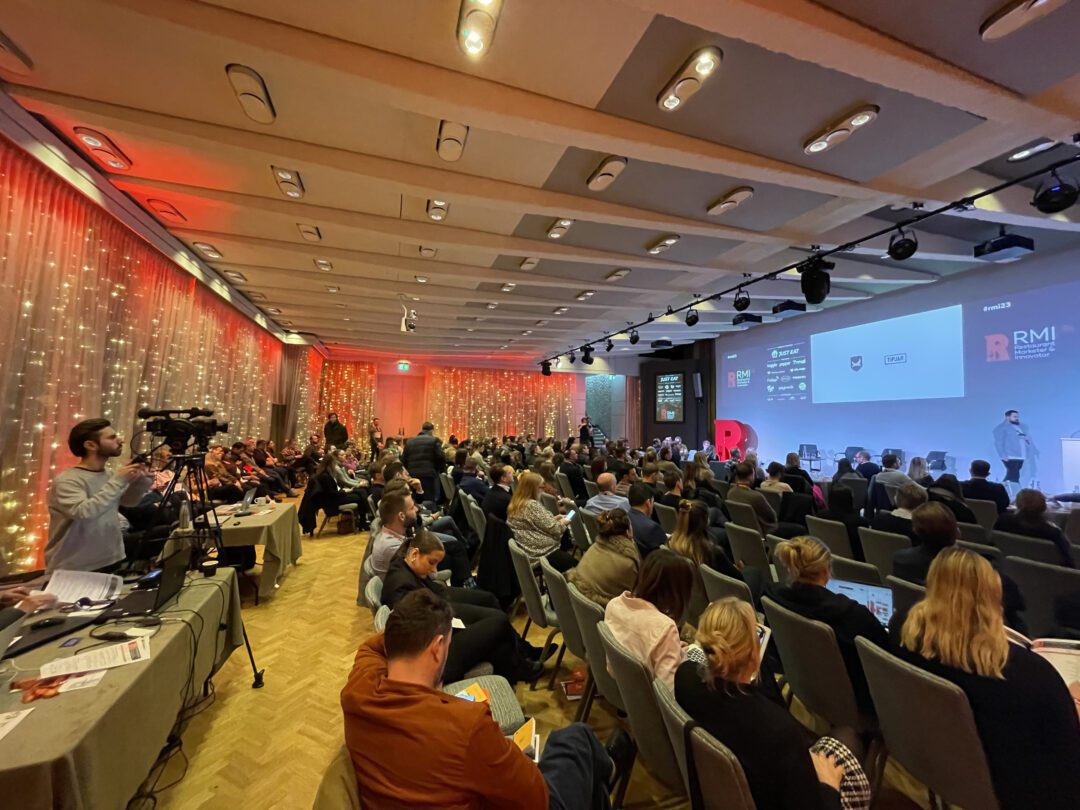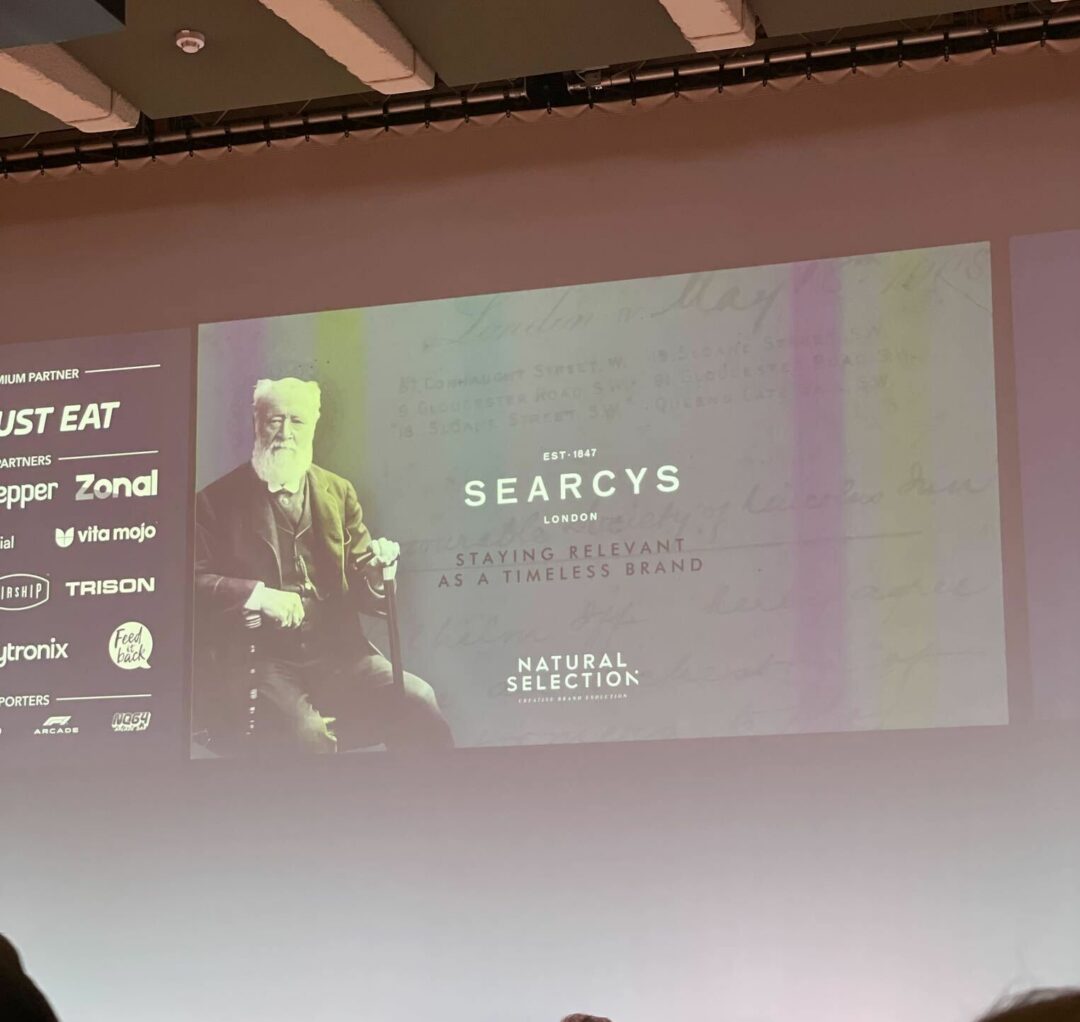The 2023 Restaurant Marketer & Innovator European summit saw the marketing, development and innovation teams from top hospitality brands descend on One Moorgate Place in central London.
From adapting to new technology and launching an omnichannel operation, to dealing with the labour shortage and building a Lego restaurant, the range of subjects was staggering.
Couldn’t make the conference? Check out some of our handpicked insights from across the talks below.

1. It’s all about lateral thinking and brand boldness
Lateral thinking
In his opening remarks, James Hacon from THINK Hospitality urged marketers to think boldly and take risks, instead of simply trying to ride out the “perfect storm” of issues facing the industry.
This advice was echoed by Rory Sutherland and Daniel Bennett in their talk combining hospitality and psychology. The pair put the onus on operators to think laterally and find novel solutions from data in order to build up brand strength.
“Noticing something that should be there – but isn’t – is the way to solve business problems,” Sutherland advised.
As an example of creative data interpretation, he drew attention to the fact that most coffee shops close at 4pm. “Operators think ‘there’s no point staying open longer than 4pm as there’s no orders’. But maybe there are no orders because the shop is already closing up by 3pm,” he suggested with a laugh.

Brand Boldness
And when you see a gap in the data to solve? Putting your brand front and centre to serve you and connect with customers can be a winning strategy.
Daniel Bennett praised Dishoom for their campaign to attract more off-peak customers when a general discount wasn’t delivering. Instead, the Indian restaurant gave off-peak customers a dice, and then reduced their bill to £0 if they rolled a six.
Taking into account the free meals that were actually offered against the number of customers, the cost of the campaign was equivalent to offering a flat 16.6% discount to each cover.
But it created excitement, played to the brand, and encouraged customers to spend more with the potential of a free meal, delivering much more than a generic 16% discount would have. “What is equivalent economically isn’t psychology,” Bennet added.
Playing to your brand was also encouraged by Aimee Gouk, Marketing Manager at Searcys London.
Gouk showcased how the luxury brand has constantly innovated and maintained its timeless character with campaigns including ‘Searcy Shillings’ that customers could redeem for a glass of champagne.

2. Think long term to combat the labour crisis
Kurt Zdesar, Founder and Owner of Chotto Mattet, put it bluntly: “Recruitment is hell on Earth.”
Zdesar advised operators to be as flexible as possible with their staff to combat this: “We know we’re only going to be able to grow if we have the right teams.”
He also encouraged a long-term view with recruitment. “We are recruiting General Managers now for restaurants that open in a year’s time – it’s an insurance policy.”
“It’s a constant evolution of trying to find staff,” said Liana Oster – Bars Director at NoMad London. But she was keen to point out a more positive side to the industry.
Kate Nicholls – CEO of UKHospitality – explained the importance of working together with staff to create a more resilient industry post-COVID. “We exist for our customers and employees,” she said. “Resilience is so important in the sector. Focus on how to make your people, supply chain and business more resilient. Build back at the core.”
Want to chat with an expert about how you can save costs on labour?
Book a bespoke, 15-minute consultation covering what you’re doing right in your setup, and where you can make improvements below.👇
3. Big brands put customer journey first in their omnichannel strategy
Operators now are seeing the value of an omnichannel approach, and moving away from the mistaken perception that it dilutes their offering cross channel.

How do big brands get omnichannel right? This was the topic in the Omnichannel: Taking Your Sales And Marketing Cross Platform panel, hosted by our very own commercial director Nick Liddle.
With insights from Coco di Mama and Yolk as well as JustEat, the panel shone a light on how operators can create a consistent, branded journey for customers across channels.
Check out our full roundup dedicated to the omnichannel interview panel here.
4. Next level loyalty schemes are all about omnichannel
The value of loyalty schemes was showcased across the panels, with a focus on the importance of an omnichannel approach.
“We have an obligation to recognize each customer individually,” explained Andrea Mulligan, Chief Customer Experience Officer at Paytronix. “Each customer wants to be recognised as a VIP.”
Recognising customer experience was also top of the priorities for Dan Brookman – CEO at Airship and Toggle.
Brookman went on to stress the importance of maintaining a consistent experience across all ordering channels, a sentiment shared by Adam Robinson – Chief Product Officer at Pepper. “Not everyone is going to engage digitally in the same way,” he pointed out.
“They might be ordering to table or preordering through a kiosk. How do we recognise these people cross channel? It’s going to change across the segments, we need to understand those customers and how to engage them on each separate channel.”
The speakers all agreed that the smart use of the data loyalty schemes provide was a winning strategy for loyalty.

5. Let data inform your menu
As data elevates loyalty programmes, it also plays a pivotal role in menus.
Menu engineering is increasingly becoming a hot topic in hospitality, as operators analyse their offerings to boost profit as much as possible whilst cutting down on costs. This process includes looking at the cold, hard data of your menu, and potentially making some tough calls on dishes.
Simon Farrow – Category Director at Tao Group Hospitality – encouraged operators to take an objective approach. “Food is always an emotional decision,” he said.
This was echoed by Jenny McPhee, Brand Director at The Alchemist, who oversaw a revamp of the cocktail bar’s extensive menu.
Matt Snell, Chief Executive Officer at Gusto Italian, demonstrated how the brand pivoted away from a deep discount culture to a premium offering based on data.
“Customers were promiscuous,” he explained. “Booking for the next day and then not returning, just looking for the best deal.”
During lockdown, the brand took a look at the data to understand what mattered to their guests, and it wasn’t price. It was food. They used this insight to shift tactics and reposition the brand as a premium offering.

Want to find out more about data, loyalty schemes or omnichannel operations? Chat to one of our experts today to explore how you can use these insights to elevate your brand.
Speak to a member of the team
Talk to the Vita Mojo team today and see how our technology can elevate your brand, drive sales performance and increase efficiency across your business. Just leave a few details and we’ll get back to you as soon as possible.
